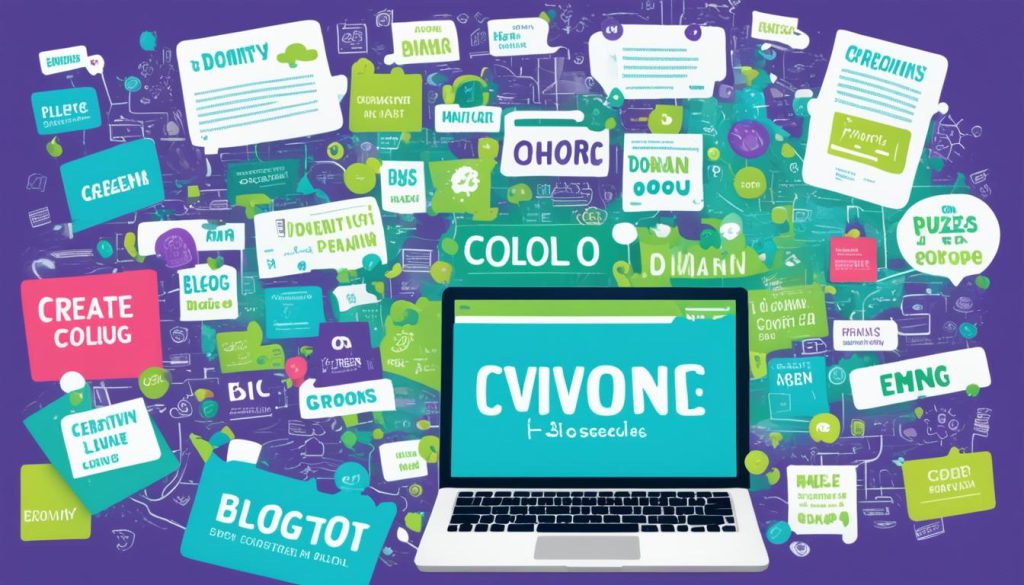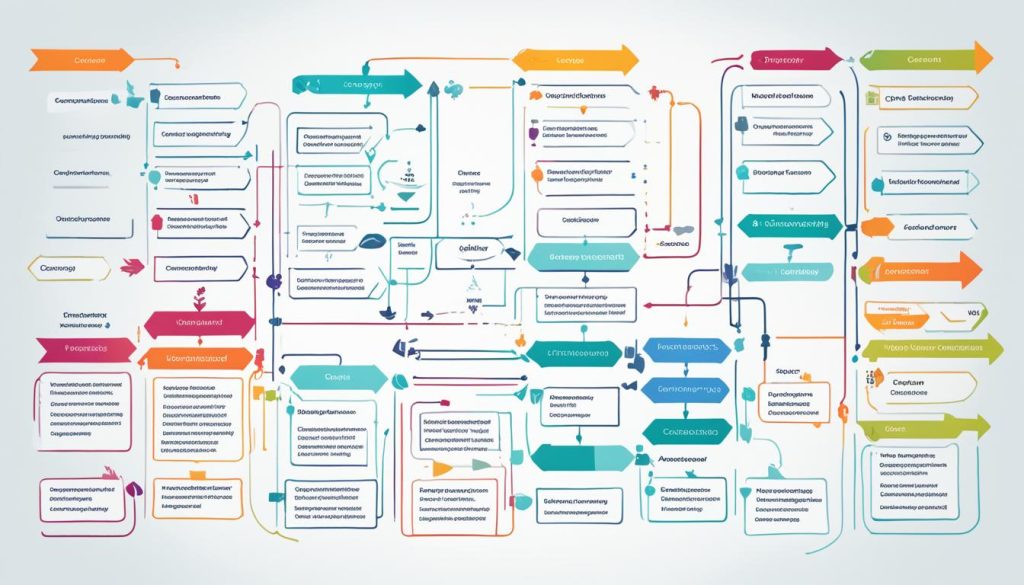Want to make your passion a full-time job? Consider blogging. It’s a low-risk way to start a business. This kind of venture can bring in serious money, giving you the chance to work anywhere. You can finally live the life you’ve been dreaming of. But, how do you make it a full-time, reliable business?
This guide will show you how to turn your love into a full-time blogging business. You’ll learn to pick a niche that earns money and how to create content people love. We’ll cover how to grow a big, loyal audience and make money smartly. With the right strategies, you can quit your day job and make a living doing what you enjoy.
Excited to start this journey and achieve your blogging dreams? Let’s begin and uncover the secrets to building your full-time blogging business.
What is a Blog and Why Start One?
A blog is like a personal journal, but it’s online and not private. It gets updated often with new posts. These posts can be about anything, like personal stories, hobbies, or important news. The main goal of a blog is to pull in readers and possibly make money online.
Definition of a Blog
A blog is a space on the internet where people or groups share what’s on their minds. It’s set up to show the newest post first. This helps readers see the latest stuff easily.
Benefits of Starting a Blog
Starting a blog has several cool advantages:
- It lets you record your life and be creative.
- You can share your ideas with others who think like you.
- It hones your writing and online marketing skills.
- It helps you build a strong online presence and trust.
- You may even make a good living out of it.
Many bloggers have turned their blogs into successful money-making ventures. But, getting there takes hard work, planning, and a commitment to keep your blog alive with interesting content. Becoming a full-time blogger could be your dream job!
Choosing a Profitable Niche for Your Blog
Choosing the right niche is key for a successful blog. In the past, the focus was on “profitable niches.” Today, blogs can make money on a wide variety of topics, like scrapbooking or tech. The main thing is to pick a topic that you love and know a lot about.
Identifying Your Interests and Expertise
To find the right niche for your blog, think about what you love and what you’re good at. Ask yourself:
- What topics do you love and get excited about?
- Which of your skills or experiences could help others?
- What problems do people face that you can help solve?
By choosing a niche that matches your interests and skills, you can make great content. Your content will really connect with your readers. This helps you stand out as a top expert in your field.
| Niche | Potential Monetization Opportunities |
|---|---|
| Health and Fitness | Affiliate marketing for health products, selling fitness e-books or workout plans, sponsored content with fitness brands |
| Personal Finance | Affiliate marketing for financial services, offering financial coaching or consulting services, selling budgeting templates or e-books |
| Parenting | Affiliate marketing for family products, selling parenting e-books or courses, sponsored content with family-focused brands. |
In today’s blogging world, there are many niches that can make money. As long as you share quality, unique content and reach your readers well, you’re good to go. Picking a niche that you are passionate about will lead you to success.
Selecting the Perfect Blog Name and Domain
Choosing the perfect blog name is key for a strong online brand. The name is the first thing people notice. It should be easy to pronounce and remember. Also, the name should reflect what your audience can expect from your content.
Consider using your own name or a catchy phrase related to your topic. For instance, a finance expert might pick names like “Savvy Cents” or “Money Matters with [Your Name].” If you love to travel, names like “Wanderlust Diaries” or “[Your Name]’s Travel Tales” work well.
After picking the best blog name, it’s time to get a domain name. Try to match your domain with your blog’s name. This makes your brand strong and easy to recognize online.
Here are some domain name tips you should keep in mind:
- Keep it short and easy to remember
- Use a .com extension if possible, as it’s the most trusted
- Avoid using hyphens, numbers, or other symbols
- Make sure your domain name is not already in use or trademarked
Getting the right blog and domain name is vital for success online. With a catchy and fitting name, you draw people to your site. It’s the start of making your blog known and loved by your target readers.

Setting Up Your Blog Website
To make your blog available online, choose a good web host. Services like Bluehost offer great plans. They make sure your blog is safe and can be seen by people. Picking a trusted host is key to your blog’s long-term success.
Choosing a Web Hosting Provider
When picking a host, think about these:
- Good uptime and fast server responses
- Lots of storage and bandwidth for your blog’s growth
- An easy-to-use control panel for site management
- Quick help from customer support if you have issues
- Affordable prices that match your budget
Top hosts like Bluehost, GoDaddy, and HostGator have easy plans for beginners. These plans help you start and run your blog website smoothly.
Installing WordPress and Customizing Your Blog
Most bloggers use WordPress. It’s free and used by over 60% of blogs. With WordPress, you can make your blog look professional. This also makes your brand shine and draws in your readers.
After choosing your host, installing WordPress is easy. You can do it with a few clicks in the control panel. Then, pick a theme from many free and paid ones. This step makes your blog stand out and easy to use.
Remember to tweak your blog’s settings and add plugins. These will help your readers and boost your search engine ranking. A blog that looks and works well helps you succeed as a full-time blogger.
Creating Engaging and Valuable Content
A successful blog starts with top-notch, informative, and interesting content. Make sure what you offer is valuable to your readers. This means knowing your niche, what your readers like and need, and consistently writing well.
Knowing how to write better and keeping up with trends is key. It helps build a steady readership that comes back for more.
For content that’s both engaging and valuable, consider these tips:
- First, do detailed market research to know what your audience wants and needs. This makes your content more relatable to them.
- Next, have a content strategy that sets your goals, who you’re trying to reach, and what content you’ll make.
- Use catchy headlines, between 60 and 100 characters long, to grab readers’ attention.
- Add interactive elements like quizzes, polls, or links to social media. This makes users more involved.
- Share visual content: photos, infographics, and videos. They’re eye-catching and get your message across clearly.
- Always have a call to action (CTA) that tells readers what to do next, like share or leave a comment.
- Choose a niche or topic to focus on. This makes your content more detailed and interesting.
- Use keywords in your posts smartly. It’ll help more people find your blog.
- Invite user-generated content such as guest posts or shared tweets. This makes your blog more real and engaging.
- Stick to a regular schedule for posting. This keeps your readers coming back.
Follow these strategies to make engaging, valuable content. It’ll set your blog as a trusted source in your field and truly connect with your audience. Always remember, content reigns supreme in the blogging world.

Building Your Audience and Driving Traffic
For bloggers, a loyal audience and steady blog traffic are key. Social media marketing and search engine optimization (SEO) are two top strategies for this.
Social Media Marketing Strategies
Social media platforms like Facebook, Instagram, Twitter, and Pinterest help connect with your audience. A solid strategy includes sharing content, interacting with followers, and collaborating with influencers. This builds loyalty and drives blog traffic.
- Create eye-catching social media posts to promote your blog.
- Respond to comments, answer questions, and join discussions to engage with followers.
- Work with other bloggers or influencers to expand your reach.
- Use social media analytics to tailor your strategy based on your audience’s preferences.
Search Engine Optimization (SEO) Techniques
SEO is key for your blog to be easily found through search engines. It includes using the right keywords, creating engaging content, and securing backlinks. Staying updated on SEO practices is vital for your blog’s visibility.
- Research and use effective keywords throughout your content.
- Include these keywords in your titles, headers, and meta descriptions.
- Add alt text and captions to your media for better SEO.
- Get backlinks from other trusted sites to improve your SEO.
- Keep up with evolving SEO trends and updates.
By combining social media and SEO, you can grow a dedicated audience and increase blog traffic. This is essential for a successful blogging business. Always adjust and enhance your strategies based on what works best for your blog and audience.

Monetization Methods for Full-Time Blogging Business
To make money from your blog, consider ways like affiliate marketing and sponsored posts. Affiliate marketing is about promoting others’ products for a commission. You can also earn from sponsorships and partnerships with brands wanting to connect with your audience.
Affiliate Marketing and Sponsored Posts
Affiliate marketing is a great way for bloggers to earn. It involves promoting products or services and getting a cut from sales. Depending on your audience and the affiliate deals, you could make from a few hundred to several thousand dollars monthly.
Securing sponsorships and partnerships with brands can also be a steady income source. If your blog’s audience is a good match for a brand, they might pay you to promote their stuff.
Offering Digital Products and Services
You could also sell digital products, like e-books, online courses, or memberships. Your expertise and relationship with your readers can help you create a consistent income.
Another option is to sell your knowledge through courses or consultations. This way, you can offer more in-depth help and make money from sharing what you know.
It’s important to always focus on providing real value to your readers. Also, keep your income streams varied and work on making your blog better. These steps can help you turn blogging into your full-time job.

Developing a Content Strategy and Editorial Calendar
Keeping a solid schedule for posting is key to keeping and growing readers. For those working to make their blog a full-time job, it’s vital to map out what you’ll post and when.
Start by finding what’s hot in your field and what your readers like. You might find they enjoy how-to guides, strong opinions, or fun lists. Knowing this helps to direct your content.
Next, group related topics together for your posts. Planning out when you’ll share each one helps keep your blog lively. It’s a way to connect with your readers regularly.
After that, set how often you’ll post and when they’ll go up. Having a plan means your site is always buzzing with new posts. This keeps readers coming back for more.

Your readers’ needs should shape your blog’s direction. If you focus on what they want, your blog will draw more fans. This is the essence of making a living from your writing.
Full-Time Blogging Business: Making the Transition
Switching from a regular 9-to-5 job to full-time blogging is a big change. It needs careful steps like growing your blog’s earnings slowly and ensuring you can rely on this new income. Create a solid plan and stick to it. That’s how you can smoothly move into full-time blogging and all the perks that come with it.
Becoming a full-time blogger doesn’t happen overnight. It’s a process that takes effort and time. One blogger, for example, worked for two years before their blog started making money. They earned cash through freelance writing to fund their blog early on.
Jessie Moore, who blogs about travel and lifestyle, gave her own advice on moving from a job to full-time blogging. She suggests having clear objectives and a solid plan. She also points out that this change can be tough.
- Start by working freelance before you make blogging your full-time gig. It’s a smoother transition.
- Have many money sources, like paid blog and social media posts, partnerships, ads, and freelance work.
- Make good marketing materials to work better with brands and other bloggers.
- Take the first step in reaching out to brands for work.
- Connect with other bloggers for advice and possible teamwork.
- Keep your work organized to be productive.
- Keep learning and improving your blog skills.
- Be very consistent with your content posting.
- Ready to change your approach as needed day-to-day.
Lily Payen, a mom of three turned food blogger, talks about balancing motherhood and blogging. She highlights picking a niche and staying consistent in content, even when life gets tough like having pregnancy sickness.
Deciding on full-time blogging is a major move. But, with the right mindset, plan, and effort, it’s an amazing path to follow. Learn from the pros and you can navigate the steps more easily, improving your chances for a successful blog business.
Scaling Your Blog and Maximizing Revenue Streams
When your blog gets bigger and more people read it, you might need help. You could hire a team or outsource work. Hiring writers, designers, or virtual assistants can keep your blog running smoothly. This lets you focus on big-picture plans and creating great content.
Outsourcing and Hiring a Team
Here’s how to make your blog bigger and earn more:
- Find out what takes the most of your time. This could be making content, managing social media, or handling emails.
- Look for skilled freelancers or assistants to do these time-consuming tasks. By delegating, you can concentrate on growing and innovating your blog.
- Use tools and apps to make your work easier and increase your productivity. There are automation systems for emails, scheduling, and managing projects.
- Think about working with other bloggers or experts. Collaborations can help you reach more readers, make better content, and find new fans.
- Always check how your blog is doing and where you’re making money. Then, focus on what works best to improve your earnings.
By outsourcing, building a team, and making choices guided by data, you can turn your blog from a hobby into a prosperous business.
| Metric | Bloggers with Under 25,000 Monthly Sessions | Bloggers with Over 25,000 Monthly Sessions |
|---|---|---|
| Primary Income Streams | Selling eBooks, Affiliate Marketing | Ads, Sponsored Posts |
| Recommended Monetization Strategies | Leveraging digital products, Affiliate partnerships | Diversifying revenue sources, Collaborating with brands |
| Potential Earnings | Building a loyal following, Earning the first $100 through affiliate marketing | Increased ad revenue, Accessing exclusive ad networks |
Staying Motivated and Overcoming Challenges
Creating a successful blog needs lots of time, work, and patience. You might get stuck sometimes with writer’s block, lose your drive, or feel like everyone else is doing what you want to do. But with the right strategies, you can stay motivated. Setting doable goals and seeking advice from pros can push you past these challenges.
Feeling uninspired is a big issue in blogging. Writer’s block can really slow you down. Try some easy writing or thinking exercises, or take a break. This can give your creativity a boost.
Motivation can drop when you feel like your blog isn’t growing fast enough. Setting realistic goals will keep you moving. Then, break these big goals into small steps. When you reach a milestone, celebrate. Also, being part of a supportive blogger group will cheer you on and keep you accountable.
The blogging world is very competitive. To do well, you have to keep learning and changing. Stay in the loop by following the latest in your field. And don’t forget to always be willing to learn from others.
Dealing with the challenges of being a full-time blogger will test your creativity and persistence. By finding the right ways to tackle problems and setting clear goals, you can keep the excitement and drive to turn your blog into a success.
Essential Blogging Tools and Resources
Using the right tools can make your journey in blogging much easier. Tools such as web hosting, content managing, and email marketing can simplify a lot. They help you in starting, growing, and maintaining your blog. By knowing these tools and regularly checking out new ones, you’ll work better and reach your blogging dreams.
Let’s dive into some powerful blogging tools and resources I’ve relied on:
- Web Hosting Platforms: Top choices include Bluehost, Hostgator, SiteGround, and BigScoots. They offer the reliability and scalability needed for your blog’s foundation.
- Content Management Systems: WordPress stands out. It easily connects with various tools and plugins, making it a strong choice for many.
- Email Marketing Services: For building and connecting with your subscribers, consider Mailchimp, Convertkit, or Mailerlite. These tools are great for engaging your email list.
- Social Media Scheduling Tools: Tools like Hootsuite, Buffer, and Sprout Social make sharing and managing your content on social media easier.
- Keyword Research Tools: When it comes to picking the right keywords, Semrush, Ahrefs, and Google Keyword Planner are top options. They help find the best words for your content.
- Productivity and Collaboration Apps: Stay on top of things with Asana, Google Docs, and Dropbox. They help you and your team work better together and boost efficiency.
| Tool | Purpose | Key Features |
|---|---|---|
| Canva | Graphic Design | Customizable templates, easy-to-use design tools, and a wide range of visual assets. |
| Grammarly | Editing and Proofreading | Advanced grammar and spelling checks, tone adjustments, and writing enhancement suggestions. |
| Hemingway App | Content Readability | Identifies complex sentences, passive voice, and areas for improved readability. |
Choosing the right tools can majorly improve how you blog. They help with productivity, the quality of your writing, and the success of your blog overall.
Networking and Collaborating with Other Bloggers
Working with fellow bloggers in your field is a smart move. It helps you reach more people, learn from pros, and find new ways to grow. You might write posts for each other’s blogs, join events, make content together, or team up in business. This can give you fresh views, chances to help each other out, and friends to support your blog.
One big win from teaming up with other bloggers is reaching their readers. When you share posts or make content together, you get seen by a bigger crowd. This helps pull more people to your site and adds new followers.
Also, teaming up with top experts can really boost your blogging game. It’s a chance to pick up tips, see things from a different angle, and get new creative sparks. By talking, joining events, or doing webinars together, you can make your blog even better.

